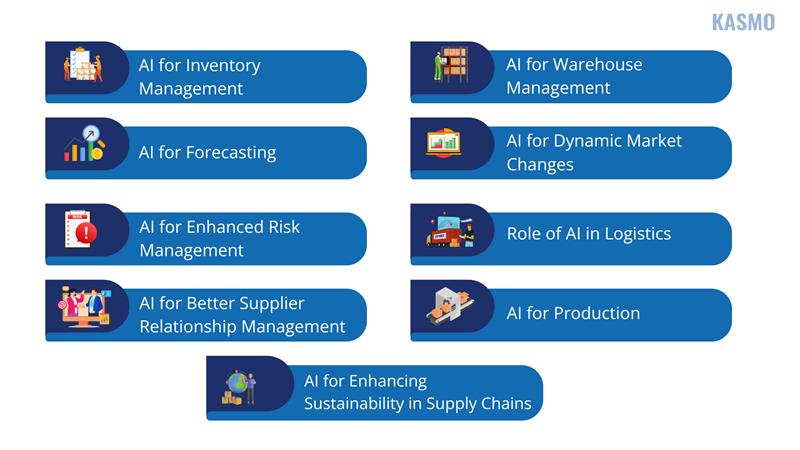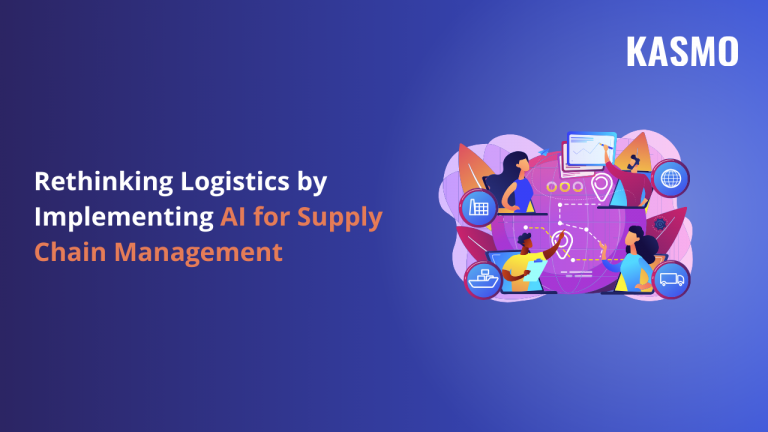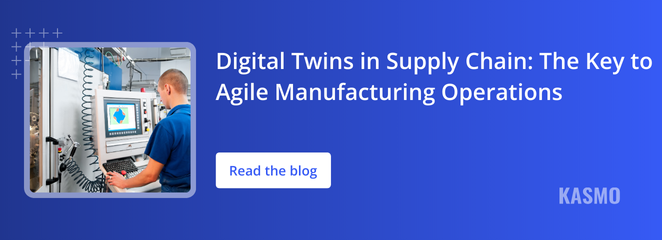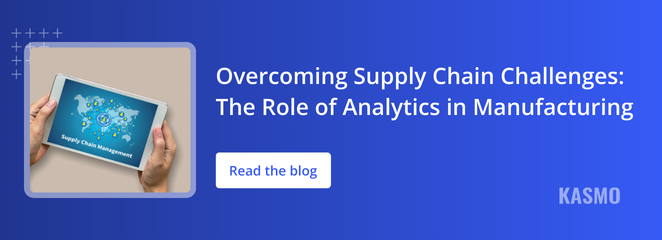Introduction
Companies are under increasing pressure to meet consumer demands while optimizing operational costs. Traditional supply chain management often relies on manual processes and fragmented systems to capture and analyze data from multiple touchpoints in the supply chain. Therefore, traditional supply chain management is not enough anymore. If companies aim to meet consumers’ demands on time, they need to adopt AI for supply chain management, cloud platforms and advanced machine learning models to capture and analyze vast volumes of data.
AI is creating a significant impact on supply chain management. According to a survey conducted by EY, 40% of supply chain organizations are investing in Gen AI. By leveraging AI, manufacturers and suppliers can gain an in-depth view on inventory and warehouse management, forecasting and logistics. With AI-powered tools and machine learning models, businesses can streamline operations, reduce inventory wastage, and enhance customer satisfaction.
Role of AI in Supply Chain
By implementing AI in logistics and supply chain, companies can easily handle key functions such as inventory management, demand forecasting, and logistics optimization. The integration of AI and machine learning (ML) models enable businesses to not only predict future trends but also respond to dynamic market conditions in real-time. The use of AI and machine learning models in logistics and supply chain is helping businesses manage risks, optimize routes, and improve operational efficiencies.

AI for Inventory Management
Manufacturers and suppliers can effectively manage their inventory by leveraging AI. It ensures that companies maintain the right amount of stock, minimizing both overstocking and stockouts, which can be expensive for businesses. By integrating AI-powered solutions suppliers can improve inventory management, creating more accurate and responsive systems.
Research by McKinsey shows that “Successfully implementing AI-enabled supply-chain management has enabled early adopters to improve logistics costs by 15 percent, inventory levels by 35 percent, and service levels by 65 percent, compared with slower-moving competitors.”
AI can analyze data in near real-time, enabling suppliers to improve inventory levels. This ensures that stock levels remain balanced, reducing carrying costs (the expenses incurred to suppliers for storing and holding inventory over time). Leveraging AI for supply chain management also helps suppliers improve customer satisfaction through better order fulfillment. For example, integrating AI with your sales data and weather reports enables businesses to predict weather conditions and market change, with remarkable accuracy.
AI for Warehouse Management
AI and machine learning models help suppliers continuously monitor stock levels across different warehouses, retail outlets, and distribution centers. This continuous analysis eliminates the need for businesses to no longer manually calculate and update stock levels, saving time and reducing human error. Automated stock-level adjustments help businesses optimize their supply chain, ensuring items are available throughout different warehouses and distribution channels.
AI also drives automation within warehouses. By using AI-powered robotic systems to pick, pack, and sort goods, businesses can automate labor-intensive tasks, improve efficiency and reduce human errors. By leveraging AI, suppliers can not only enhance the speed of their operations but also get insights into areas for improvements in the warehouses.
AI for Forecasting
Forecasting demand accurately is another crucial component to creating an efficient supply chain. Without precise forecasting, businesses risk either overstocking (leading to excess inventory) or understocking (leading to missed sales opportunities). AI has become a game-changer in demand forecasting, offering tools that improve both accuracy and responsiveness.
AI-powered systems excel at analyzing large volumes of historical sales data and other external variables to predict future demands. By processing this data quickly and efficiently, AI enables businesses to identify patterns and anticipate changes in consumer behavior. For example, AI can detect demand fluctuations based on seasonal trends, market shifts, or changes in customer preferences. This level of precision allows businesses to adjust their inventory levels proactively, preventing stockouts or overstocks.
AI for Dynamic Market Changes
One of the significant advantages of leveraging AI for supply chain management is its ability to help suppliers adapt easily to market changes. AI-powered systems leverage real-time data and integrate with historic data to predict customer demands and market conditions. Suppliers can utilize these AI-powered tools and create strategies that can help them adapt to market conditions. This flexibility ensures that businesses can always stay one step ahead, responding quickly to sudden demand spikes or dips.
AI also incorporates external factors such as geopolitical situations, weather forecasts, and the global economic conditions to help suppliers understand future dips or spikes in market demands. For instance, machine learning algorithms can predict the impact of an upcoming natural calamity on product demand or calculate how a market recession might affect purchasing behavior.
AI for Enhanced Risk Management
While inventory management and demand forecasting are critical, AI’s role in supply chain optimization extends far beyond these functions. By implementing AI in logistics and supply chain, businesses can drive better efficiency across all stages of the supply chain.
Supply chains are susceptible to a variety of risks, from natural disasters to geopolitical tensions or even supplier disruptions. AI can model various risk scenarios, simulate the effects of different disruptions and help businesses develop contingency plans. For example, AI can assess potential delays from suppliers or transportation providers and suggest alternative strategies, such as rerouting shipments or finding backup suppliers. Predictive risk management enables businesses to react quickly and mitigate the effects of unexpected events.
Role of AI in Logistics
Logistics play a crucial role in improving the efficiency of the supply chain. By integrating AI in logistics, suppliers are empowered to make strategic decisions regarding which routes will be safer and quicker for delivering their products. By analyzing factors such as traffic patterns, weather forecasts, and delivery deadlines, AI can suggest the most efficient routes for transportation.
This not only reduces transportation costs but also improves delivery times, helping companies meet customer expectations. As AI suggests the best routes, businesses can minimize fuel consumption and reduce the emission of harmful gases.
AI for Better Supplier Relationship Management
AI can also help businesses improve supplier relationships by analyzing supplier performance data. By examining factors such as lead times (the total time it takes for a product to move through the supply chain, from the moment an order is placed until the final delivery to the end customer), quality, and past supplier’s performance, AI identifies potential risks and suggests alternative suppliers if necessary. This proactive approach helps businesses create better supplier relationships while minimizing the impact of disruptions.
AI for Production
By adopting AI for supply chain management, suppliers can move towards demand-driven production. Analyzing real-time consumer demands can help manufacturers adjust production schedules, ensuring that their resources are used optimally. This not only reduces waste but also ensures that products are manufactured in the right quantities and at the right times, minimizing storage costs and improving supply chain efficiency.
AI for Enhancing Sustainability in Supply Chains
AI is not only improving operational efficiency – it is also helping businesses become more sustainable. By leveraging AI to optimize supply chains, companies can reduce waste, minimize carbon emissions, and promote ethical sourcing practices.
Generative AI can help companies identify areas where they can reduce their carbon emissions. For instance, AI can analyze supplier data and suggest more sustainable alternatives or find ways to reduce waste in the production process. By improving sustainability, AI helps businesses meet consumer demands for eco-friendly products and comply with environmental regulations, all while reducing operational costs.
Challenges Companies Face While Integrating AI in Supply Chains

Struggle with Legacy Architectures
According to Gartner, only 10% of CEOs use AI in their business strategically. This can be due to businesses still using legacy architectures. Many organizations attempt to embed AI in legacy architectures that lack the agility to support real-time, AI-driven insights, resulting in friction and inefficiencies in supply chain management.
Fragmented Data
AI alone cannot help businesses get desired results from their supply chains. It relies heavily on clean, consistent, and unfragmented data. However, most companies operate with multiple disconnected systems (e.g., different ERPs) and inconsistent data. This leads to incomplete or outdated inputs generated by AI-powered models.
Complex AI-Powered Tools
Sometimes AI-powered tools are not designed with end users in mind. They can be complex, and businesses find it difficult to train their employees to leverage these AI-powered tools. Supply chain professionals may find these tools overwhelming, especially when they require manual reconciling of information across different systems. This reduces efficiency and discourages adoption of AI-powered tools.
Limited Employee Training and Support
Many organizations lack the time and resources required to prepare their workforce for AI. This creates challenges for employees, as they may not be able to understand how AI applications work or how to interpret the outputs. This knowledge gap leads to reluctance in using AI.
Leverage Snowflake – Your Solution to Supply Chain Challenges
As businesses embrace AI to modernize their supply chains, they often encounter significant challenges—legacy systems, fragmented data, complex AI-powered tools, and technical skill-gap in workforce. Snowflake AI Data Cloud platform helps businesses overcome these hurdles by offering a modern, scalable, and secure data cloud platform designed to support businesses planning to leverage AI for supply chain management:

Migrating from Legacy Architecture to Cloud-Native Environment
Businesses using legacy architectures are observing that these architectures are not built to handle vast volumes of data. These legacy architectures prevent businesses from accessing their data and getting real-time insights. Snowflake’s cloud-native architecture eliminates these constraints and provides a cost-effective solution to businesses.
Snowflake provides unlimited storage that scales along with growing volumes of data, eliminating the need for businesses to look for external storage to store their data. By migrating their data from legacy architecture to Snowflake, businesses can maintain data integrity and integrate the raw data with AI to get actionable insights.
Unifying and Integrating Data
AI thrives on high-quality, integrated data. Snowflake supports structured, semi-structured, and unstructured data from multiple sources, including ERPs, IoT devices, and external partners. It allows secure, real-time data sharing and provides robust data governance—essential for all AI models.
Simplifying AI Adoption
Snowflake accelerates AI adoption by unifying data on a single platform. It supports structured and unstructured data, enables fast development of AI apps, and integrates Large Language Models (LLMs) from OpenAI, Anthropic, and Meta. With tools like Cortex AI, Snowflake ML, and Feature Store, users can build, train, and deploy models efficiently. Running AI models in the same environment where you are storing your data reduces complexity and costs. Snowflake’s strong governance policies ensure that your sensitive data is protected even while data sharing.
Enabling Real-Time Decision-Making
From demand forecasting to risk management, Snowflake enables real-time analytics and predictive modeling. Businesses can adapt quickly to market changes, optimize logistics, and enhance customer experiences.
Why Choose Kasmo as Snowflake Implementation Partner
As a proud Premier Partner of Snowflake, Kasmo provides innovative Snowflake-powered solutions and accelerators to businesses planning to integrate AI in supply chains. Our Supply Chain AI Advisor is an advanced Snowflake-powered accelerator, designed specifically for suppliers – integrates two powerful machine learning models to revolutionize supply chain management:
- Demand Forecasting Model: Utilizing historical data and machine learning algorithms, this model accurately predicts future product demand. Users can input sales history, market trends, and seasonal patterns to enhance predictions.
- Raw Material Forecast Model: Predicts future raw material requirements based on production schedules, inventory levels, and consumption patterns. It optimizes inventory management, reduces costs, and ensures smooth production processes.
Our Supply Chain AI Advisor accelerator empowers businesses to enhance decision-making and operational efficiency. By leveraging these models, businesses can optimize inventory levels, reduce costs, minimize supply chain bottlenecks and improve supply chain performance.
With 250+ certified Snowflake consultants, we offer deep expertise to global businesses looking to improve their supply chain management. We are a digital-first cloud-born company, and we are dedicated to providing end-to-end support to businesses. Our reusable and scalable solutions and accelerators expedite project delivery and ensure that you get consistent service.
Conclusion
Leveraging AI for supply chain management is transforming how businesses handle inventory management, demand forecasting, logistics, and risk management. AI enhances efficiency, accuracy, and adaptability, enabling businesses to predict demand, optimize resources, and improve customer satisfaction.
While challenges such as legacy systems and fragmented data exist, platforms like Snowflake offer scalable, secure solutions that simplify AI adoption and empower businesses to make real-time, data-driven decisions. With the right tools and expertise, companies can optimize their supply chains, reduce costs, and enhance operational performance.





